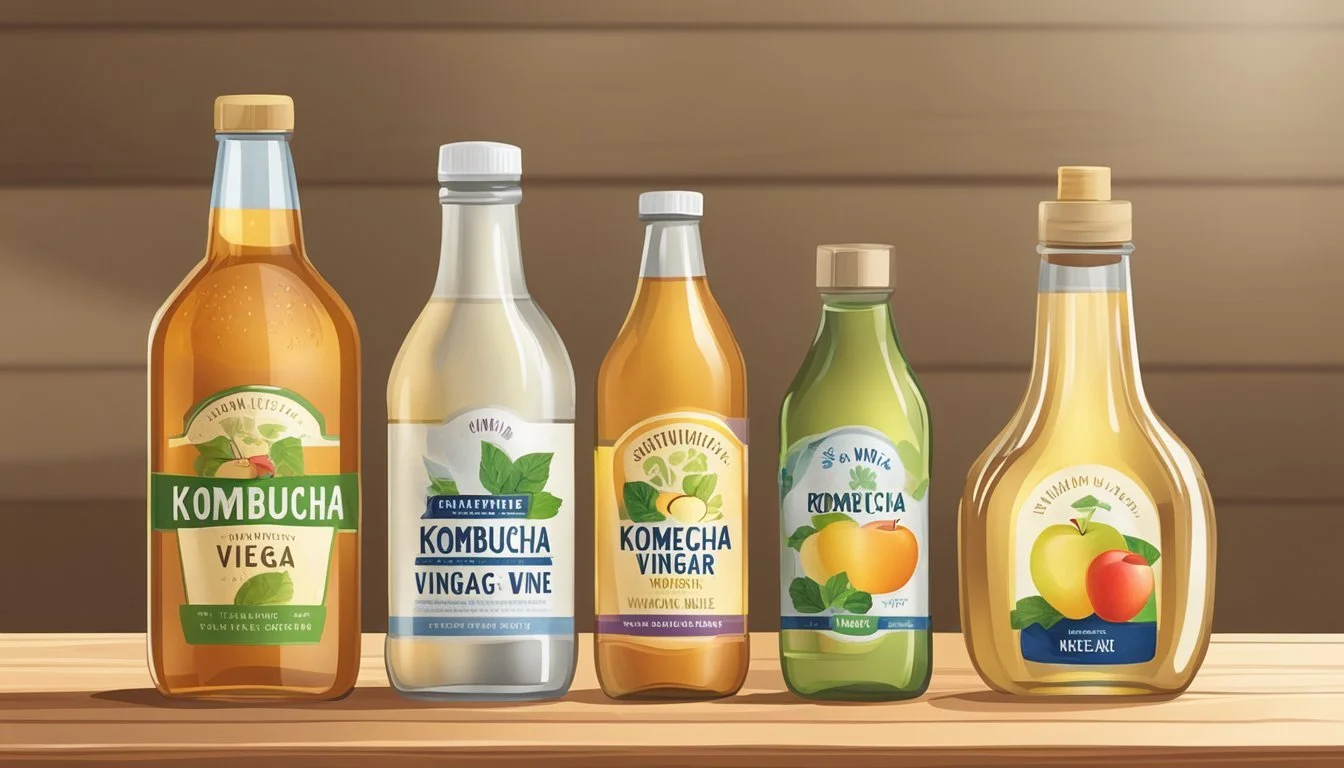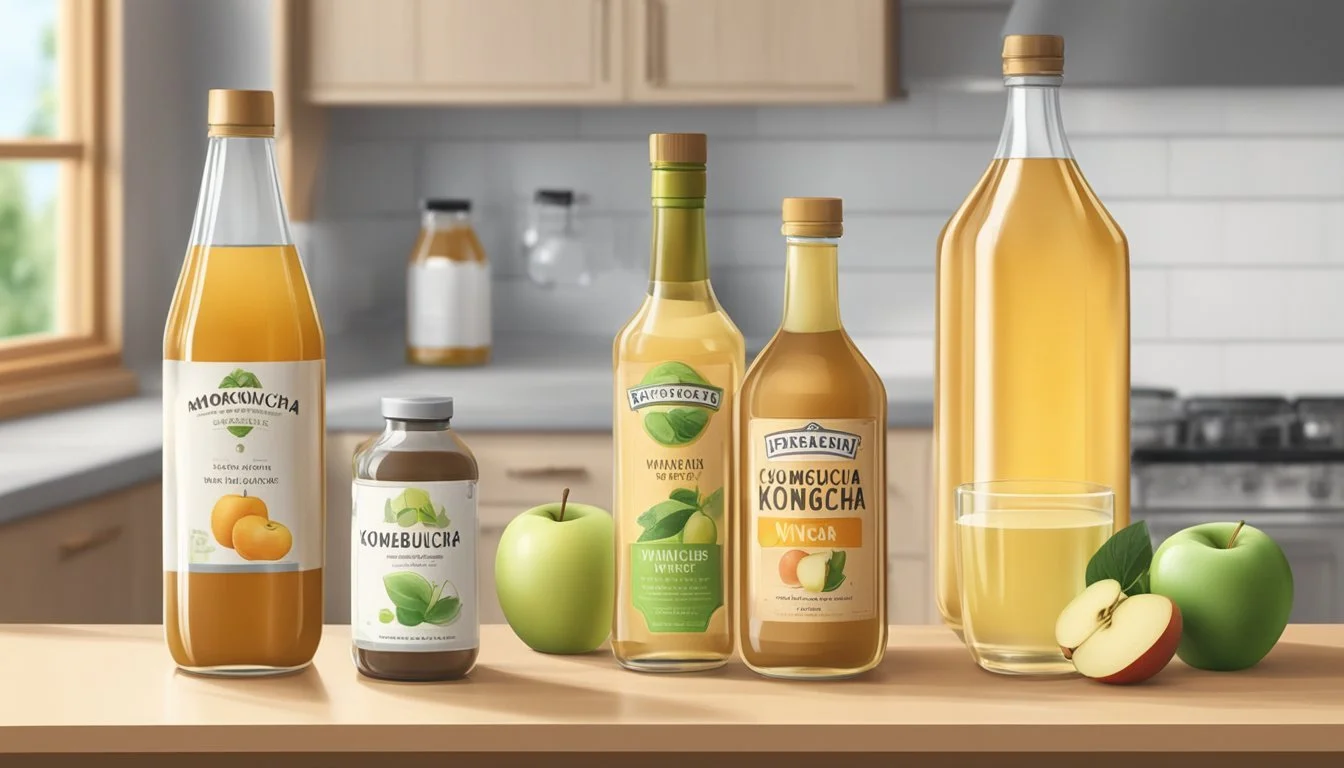Kombucha Vinegar Substitutes
Top Alternatives for Your Recipes
Kombucha vinegar, a byproduct of the kombucha fermentation process, shares several characteristics with traditional vinegar, including acidity and a complex flavor profile. Made from fermented tea, kombucha itself is rich in probiotics, potentially providing digestive and immune system benefits. When kombucha is allowed to ferment past its typical beverage stage, it becomes kombucha vinegar, which can be used in a variety of culinary contexts, much like apple cider vinegar or other types of vinegar.
However, not everyone may have access to kombucha vinegar, or they might prefer a milder taste or a different flavor complexity in their recipes. In such cases, substitutes come in handy. Various alternatives, such as apple cider vinegar, offer a similar tangy, acidic flavor that can complement dishes in a way that is comparable to kombucha vinegar. Other substitutes include different fermented liquids that maintain the health benefits of probiotics, albeit with their distinct taste profiles.
When selecting a substitute for kombucha vinegar, the key is to match the acidity and flavor notes of the original ingredient as closely as possible. For instance, kefir, particularly water kefir, might be a suitable replacement, offering fermentation-derived benefits while contributing a slightly different flavor. Coconut water kefir can also provide a unique twist, and for recipes where a non-alcoholic substitute is desired, ginger beer or non-alcoholic beer can impart a comparable fermentative essence. The choice of substitute will ultimately depend on the desired outcome of the recipe, taking into account both the taste and potential health benefits.
Understanding Kombucha Vinegar
Kombucha vinegar arises from the prolonged fermentation of kombucha, a beverage made from sweetened tea and a symbiotic culture of bacteria and yeast, commonly referred to as a SCOBY. Typically, kombucha undergoes a fermentation process lasting around seven to twelve days, after which it becomes mildly alcoholic and acidic, rich in probiotics, and contains antioxidants.
Fermentation Process: If the kombucha is left to ferment longer—usually for several weeks to a month—the acidity increases, transforming it into kombucha vinegar. This vinegar contains probiotics, which are beneficial bacteria that support gut health. The extended fermentation period allows a higher concentration of acetic acid to develop, giving kombucha vinegar its potent sour taste and preserving properties.
Acidity and Substitution: Due to its acidity, kombucha vinegar can often be used as a substitute for traditional vinegars in recipes. However, the level of acidity may vary, so adjustments may need to be made to achieve the desired flavor profile. If the kombucha vinegar retains some sweetness, reducing other sweet ingredients in the recipe can balance the taste.
Health Benefits:
Probiotics: Supports digestive health.
Acetic Acid: May help regulate blood sugar levels post meals.
Antioxidants: Can neutralize free radicals.
Besides its use in culinary applications, kombucha vinegar's antimicrobial properties due to its acetic acid content, may make it suitable for a range of household and personal care uses. Despite its potential benefits, it is important to approach health-related claims with due skepticism and understand that kombucha vinegar is a complement to a balanced diet and should not be seen as a cure-all.
Fundamentals of Substituting Vinegar
When one seeks to substitute vinegar in a recipe, understanding the fundamental characteristics of vinegar is essential. Vinegar imparts a distinct acidity and flavor profile that can be a pivotal component in the overall taste of a dish. Therefore, choosing a substitute requires careful consideration of these core attributes.
Acidity
Acidity is a key attribute of vinegar; it provides the tangy taste that can brighten a dish. Substitutes should ideally offer a similar level of acidity to preserve the intended flavor of the recipe. For example, when substituting for apple cider vinegar, combining apple juice with a teaspoon of lemon juice can maintain the fruity acidity.
Flavor Profile
Each vinegar has a unique flavor profile. For instance, distilled white vinegar is known for its clean and sharp taste, whereas red wine vinegar offers a more robust wine flavor. Substitutes should complement the original vinegar's notes without overpowering the other ingredients.
Considerations for Substitution
Popular Kombucha Vinegar Alternatives
When it comes to finding a substitute for kombucha vinegar, there are several alternatives that offer varied flavor profiles and potential health benefits. Here is a breakdown of popular options to consider:
Apple Cider Vinegar
Apple cider vinegar is a fermented liquid made from crushed apples. It can easily replace kombucha vinegar in salad dressings and marinades. Rich in enzymes and with a fruity undertone, it typically has a milder taste, but still provides the tanginess that one would expect from kombucha vinegar.
Use case: Ideal for salad dressings
Flavor profile: Fruity, mildly tangy
Health aspect: Contains enzymes, may aid in digestion
White Wine Vinegar
White wine vinegar, made from fermented white wine, gives a lighter and slightly more refined acidity to dishes. It's a versatile vinegar that won't overpower the flavors of delicate ingredients, making it a suitable alternative to kombucha vinegar in various recipes.
Use case: Suitable for light sauces and seafood dishes
Flavor profile: Light, acidic
Health aspect: Fermented, may offer probiotic-like properties
Rice Vinegar
Made from fermented rice, rice vinegar has a gentle acidity and subtle sweetness. It works particularly well in Asian cuisine and can substitute kombucha vinegar in recipes that don’t require a strong vinegar presence.
Use case: Excellent in sushi, marinades, and Asian-style dressings
Flavor profile: Sweet, gentle
Health aspect: Contains amino acids
Balsamic Vinegar
Balsamic vinegar is created from grape must and often aged for several years. It is sweeter and more syrupy than kombucha vinegar, which can add a rich flavor to dressings, glazes, and reductions.
Use case: Perfect for hearty salads and glazes
Flavor profile: Sweet, complex
Health aspect: Antioxidant-rich due to grape content
Each alternative brings its own unique properties to a dish, and one can choose based on the desired flavor profile and health benefits.
Non-Vinegar Kombucha Substitutes
When seeking a substitution for kombucha, particularly for its tart flavor profile, one does not need to rely solely on vinegar-based options. There are non-vinegar alternatives that can impart the desired sourness and citrus notes into dishes.
Lemon or Lime Juice
Lemon and lime juice are excellent for mimicking the sour, citrus taste of kombucha. These juices bring brightness and zest to dishes, and can be easily adjusted for strength.
Sourness: Adjust the amount of juice to match the potency of kombucha's acidity.
Citrus Notes: Provides a similar refreshing piquancy.
Tamarind Paste
Tamarind paste, derived from the fruit of the tamarind tree, offers a complex sour flavor. Its tanginess is reminiscent of kombucha and can be used in a variety of culinary applications.
Flavoring: Introduces a fruity sourness without overpowering dishes.
Kombucha Substitute: A thicker consistency that works well in marinades and sauces.
Amchur Powder
Amchur, or dried mango powder, imparts a fruity acidity to dishes. It is a popular ingredient in South Asian cuisines and serves as an effective kombucha substitute in terms of adding a sour element to recipes.
Sour Profile: Contributes a subtle, tart flavor similar to the tang of kombucha.
Utilization: Ideal for dry rubs and spice blends where a liquid substitute is not suitable.
Cultural Variants and Unique Substitutes
In the realm of fermented beverages, various cultures have crafted distinctive drinks that can serve as substitutes for kombucha vinegar. These alternatives not only replicate the tangy quality of kombucha but also provide their own set of health benefits, particularly related to gut health.
Kefir
Kefir is a fermented milk drink originating from the Caucasus region. It's produced by adding kefir grains, which are cultures of yeast and bacteria, to milk. This results in a tangy, slightly effervescent beverage rich in probiotics. Kefir can be used as a kombucha vinegar substitute in various culinary applications, delivering a creamy texture and a boost to gut health.
Origin: Caucasus region
Texture: Creamy
Probiotics: Rich in beneficial bacteria
Water Kefir
Water kefir, also known as tibicos, is a lighter alternative to traditional kefir. It's made by fermenting sugar water, coconut water, or fruit juice with water kefir grains. While it shares the probiotic qualities of milk-based kefir, water kefir has a milder taste and is suitable for those looking for a non-dairy substitute with a similar fizziness and acidity to kombucha vinegar.
Also Known As: Tibicos
Base: Sugar water, coconut water, or fruit juice
Taste: Mild and non-dairy
Kvass
Kvass is a traditional Eastern European fermented beverage typically made from rye bread. The fermentation process yields a drink with a unique, earthy flavor and a slight sourness, akin to kombucha vinegar. Kvass is revered not only for its distinctive taste but also for its digestive benefits.
Region: Eastern Europe
Base Ingredient: Rye bread
Flavor Profile: Earthy, slightly sour
Rejuvelac
Rejuvelac is a non-alcoholic, fermented liquid made from sprouted grains such as wheat berries, rye, or quinoa. Its flavor is mildly sour and somewhat grassy, making it a useful substitute for kombucha vinegar in salad dressings and marinades. Rejuvelac is appreciated for its digestive benefits, as it supports gut health with its content of live enzymes and beneficial bacteria.
Made From: Sprouted grains (wheat, rye, quinoa)
Flavor: Mildly sour, grassy
Health Benefit: Enzymes and probiotics for digestion
Each of these beverages offers a distinct cultural take on fermentation, with flavors and properties that provide substitute options for those looking to maintain or enhance the probiotic and flavor profiles in their culinary creations.
Benefits of Different Substitutes
When looking for a Kombucha vinegar substitute, one should consider the health benefits and culinary properties of available options. A variety of beverages can function as substitutes, each with their own set of benefits.
Kefir: This fermented milk drink is rich in probiotics, enhancing digestive health and bolstering the immune system. It also contains a range of B-vitamins.
Coconut Water Kefir: A dairy-free option, coconut water kefir shares similar probiotic benefits to traditional kefir, also aiding in digestion and hydration due to its high electrolyte content.
Jun Tea: Often dubbed the "champagne of Kombucha," this tea is made with green tea and honey, featuring a more delicate taste and a probiotic profile that may support the immune system.
Ginger Beer: While non-alcoholic and naturally fermented, ginger beer contains beneficial organic acids and aids in digestion due to the presence of ginger.
Apple Cider Vinegar: It has a tangy flavor profile similar to Kombucha and contains organic acids. Also known for its potential health benefits, apple cider vinegar is believed to support digestion and glucose metabolism.
Each substitute carries its own unique flavor and health properties which users should evaluate based on their nutritional needs and taste preferences. It's important that they match the acidity and sweetness levels when substituting, to maintain the balance in recipes and beverages.
Creating Your Own Substitutes
When one considers creating their own kombucha vinegar substitutes, they often look to harness the versatile nature of vinegar through do-it-yourself (DIY) methods. The creation process typically involves fermentation and can cater to preferences regarding enzymes, caffeine content, and flavoring.
Homemade Fruit Vinegars
To craft Homemade Fruit Vinegars, one starts by selecting ripe, high-quality fruits. A basic recipe involves chopping the fruit and combining it with sweetened tea, a natural starter for the fermentation process. Fermentation time can vary, but it generally takes a few weeks for the natural sugars to transform. Care should be taken to strain the fruit and bottle the liquid once the desired acidity level is achieved.
Ingredients:
Ripe fruit of choice
Sweetened tea
Fermentation starter (e.g., live vinegar or kombucha SCOBY)
Process:
Combine chopped fruit with sweetened tea in a sterilized jar.
Add a fermentation starter.
Cover with a breathable cloth and secure with a rubber band.
Allow to ferment for several weeks, checking and stirring periodically.
Strain and bottle the vinegar, discarding the fruit solids.
Herbal Infusions
Herbal Infusions offer a caffeine-free alternative and can imbue the final product with distinct flavors and potential health benefits. Herbs, such as thyme, rosemary, or basil, can be steeped in a base of existing kombucha vinegar to create an aromatic substitute. The duration of steeping varies with the intensity of flavor desired. To include beneficial enzymes in the substitute, users should avoid boiling the herbs; instead, they could opt for a cold infusion process.
Ingredients:
Kombucha vinegar or neutral vinegar base
Fresh or dried herbs of choice
Process:
Fill a clean jar with the chosen herbs.
Pour kombucha vinegar over the herbs to cover.
Seal the jar and let it infuse, away from direct sunlight.
Taste periodically and strain when the desired flavor strength is reached.
These DIY methods for creating kombucha vinegar substitutes provide a personalized approach to flavoring and utilizing this unique fermented product.
Using Substitutes in Recipes
When a recipe calls for vinegar, and one either doesn't have it on hand or is looking for a different flavor profile, they can consider various substitutes. Kombucha, for instance, can provide a similar tanginess along with additional health benefits, but the substitutes can vary depending on the type of recipe.
Marinades and Dressings
In marinades and dressings, the acetic acid of vinegar tenderizes and flavors the ingredients. When one substitutes kombucha, it's important to account for its milder acidity and potential sweetness. For marinades, an equal amount of kombucha can often suffice, but one might need to adjust the quantity based on the desired sourness and the kombucha's own flavor intensity. For dressings, if kombucha is sweeter, reducing added sweeteners like honey or sugar is recommended.
Salad dressings: Start with a one-to-one substitute, and then adjust to taste.
Marinades: Increase the amount slightly if the kombucha isn't as acidic as the vinegar it replaces.
Beverages and Cocktails
Kombucha's effervescence and unique flavor profile make it an inventive substitute in both non-alcoholic beverages and cocktails. Its natural fizz adds a new dimension to mixed drinks, which can make an exciting alternative to carbonated mixers. When it replaces vinegar in a cocktail, the drink gains probiotics and a complex taste without an overpowering vinegar punch.
Non-alcoholic beverages: A splash of kombucha adds fizz and a tangy flavor to homemade sodas or mocktails.
Cocktails: Replace vinegar-based shrubs with kombucha for a probiotic twist on classic sours or highballs.
Handling and Storage of Substitutes
When opting to use kombucha as a vinegar substitute, one must handle and store it properly to maintain its quality and shelf life. Kombucha is more than just a beverage; its acidic nature allows it to replace vinegar in many recipes. However, because it contains caffeine and live cultures, its storage differs from that of regular vinegars.
At Room Temperature:
Kombucha should be stored in a cool, dark place if it has not been opened. Once the seal is broken, kombucha needs to be refrigerated to slow down the fermentation process. If left at room temperature after opening, it will continue to ferment and can become overly sour or even alcoholic.
Refrigeration:
To preserve kombucha's taste and prevent further fermentation, one should keep it in the refrigerator. This is particularly important for kombucha with added fruit juice or flavorings, as these can ferment more quickly.
Shelf Life:
Unopened kombucha can last for up to two months at room temperature.
Once opened, kombucha should be consumed within a week for optimal flavor.
After using it as a substitute, if any kombucha remains, store it in the fridge immediately.
Avoid Contamination:
Always use clean utensils when handling kombucha to prevent contamination. Do not drink directly from the kombucha bottle if planning to store it again, as this can introduce bacteria that may affect the shelf life and taste.
Containers for Storage:
Glass containers are preferred for storing kombucha because they do not react with the acidity. Ensure the lid is tight to avoid carbonation loss, which can affect the acidity level needed for your recipes.
By following these guidelines, one ensures that their kombucha remains a safe and effective substitute for vinegar, while preserving its unique flavor and beneficial properties.
Conclusion
Kombucha vinegar is lauded for its probiotic benefits and its role in supporting digestion. However, one may encounter situations where a substitute is necessary. A variety of alternatives are available, each bringing their unique properties and health implications.
Substitute Options:
Ginger Beer: Offers a spicy profile; non-alcoholic versions provide a flavor twist without the probiotic aspect.
Apple Cider Vinegar: While lower in probiotics, it retains the tangy flavor and can serve as a digestive aid.
Non-Alcoholic Beer: Mirrors the fermented taste of kombucha vinegar; however, it typically lacks beneficial bacteria.
When considering a kombucha vinegar alternative for culinary purposes or health benefits, it is vital to recognize the distinct attributes of each substitute. The chosen substitute will influence not only the taste profile but also the nutritional and digestive benefits of the dish or beverage.
Each alternative presents a compromise between flavor and probiotic content, urging consumers to weigh their priorities. One may opt for apple cider vinegar for a calorie-conscious choice, or ginger beer for a non-traditional yet zesty flavor. It is this versatility that empowers individuals to tailor their selections to specific dietary needs and taste preferences while maintaining the essence of the original ingredient.











